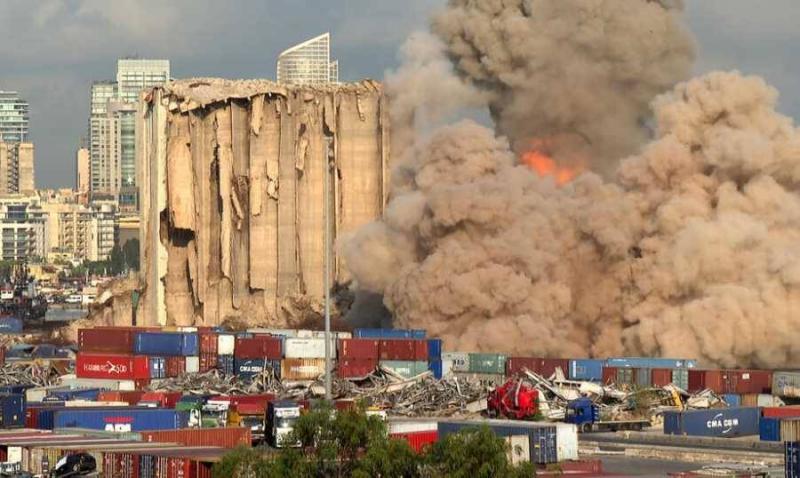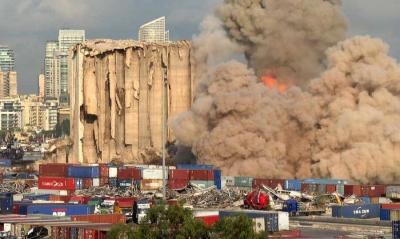The desire of the Cassation Public Prosecutor, Judge Jamal al-Hajjar, coincides with the will of the investigative judge in the Beirut port explosion case, Judge Tarek Bitar, to resume the stalled investigation, which has been paused for over two years. Visitors of Hajjar, who recently assumed his position, stated that he has "a vision for resolving the legal obstacles hindering the work of the investigative judge." They confirmed to "Asharq Al-Awsat" that Hajjar will discuss with Bitar in subsequent meetings a series of ideas aimed at reviving the investigation process and restoring the relationship between him and the Cassation Public Prosecutor's office, which has been completely on hold for 13 months.
Cooperation between the investigative judge and the Cassation Public Prosecutor's office ceased at the beginning of February 2023 due to a legal interpretation issued by Bitar, which asserted that an investigative judge assigned to investigate a crime affecting state security cannot be dismissed. He based this on an interpretation by the late head of the Supreme Judicial Council, Judge Philippe Khoury, who confirmed that members of the Council cannot be dismissed and that the investigative judge holds equal importance to Council members.
Following this interpretation, Bitar announced the resumption of his investigations and issued a list of additional defendants, including the former Cassation Public Prosecutor, Judge Ghassan Oueidat, and the Public Attorney, Judge Ghassan Khoury. He scheduled dates for their questioning, prompting Oueidat to instruct judges and the Cassation Prosecutor's office to cease all dealings with Bitar, refusing to accept any documents from him or execute his memos. He subsequently filed a lawsuit against Bitar for impersonating an investigative judge and usurping judicial authority, and made a decision to release all 19 detainees in the port case, which sparked widespread legal controversy. Some argued that Oueidat's decision was illegal, as a public prosecutor cannot release any defendant under a detention order, since this authority belongs solely to the investigative judge.
**Families of the Victims and Hajjar's Courage**
Last Wednesday, Hajjar met with a delegation of the families of the Beirut port explosion victims, who expressed their fears about attempts to obscure the truth and informed him they are counting on his courage and independence from political pressures. Sources close to the meeting reported that the Cassation Public Prosecutor promised the families that he would not accept to lead the Cassation Public Prosecutor's office while keeping the investigation frozen. The sources clarified that Hajjar called the families to remain calm and patient, and to trust in his belief in their case, which he considers a matter for all Lebanese citizens.
The sources pointed out that the Cassation Public Prosecutor explicitly stated that he does not possess a magic wand to solve the issue, and he is not the sole authority that makes the decision to resume the investigation. The case faces significant legal hurdles that he will attempt to overcome calmly and gradually, in coordination with Judge Bitar, who is directly handling the case.
Shortly after Hajjar was appointed to lead the Cassation Public Prosecutor's office and began his duties, he met with investigative judge Tarek Bitar for more than an hour. The atmosphere of the meeting was described as very positive, marked by mutual respect between the two men, indicating the start of a new phase of cooperation between the prosecutor's office and Bitar, as he began to visit his office at the Palace of Justice to reorganize his file.
**The Fate of External Requests**
Sources closely following the case indicated that Bitar is acting as if he is very close to resuming his investigations with the defendants who have not yet appeared before him. They explained to "Asharq Al-Awsat" that this depends on the extent of cooperation from the Cassation Public Prosecutor's office regarding the execution of the memos he previously issued which have not been executed, or those he will issue later. The investigative judge is currently seeking information about the requests he sent abroad before the investigations were halted due to dismissal lawsuits following the conflict with Oueidat. He is waiting to receive documents from abroad as responses to the requests he sent to the concerned countries about their importance and wants to ascertain whether the Cassation Prosecutor's office sent other requests he drafted before the crisis erupted with them, and whether the concerned countries halted their execution due to the judicial dispute.
While optimistic sentiments coexist with fears regarding attempts to hinder the resumption of the investigation, sources are adamant that the situation does not allow for further delays. They confirmed that Bitar will conclude his investigations and issue the indictment within a period not exceeding six months or by the end of the current year at the latest.




